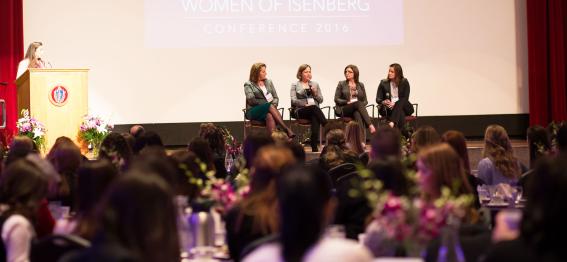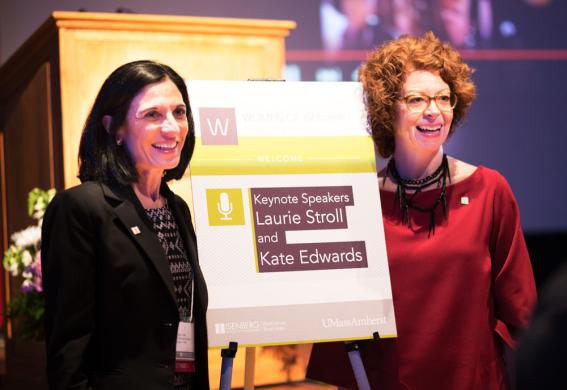Third Annual Women of Isenberg Conference Explores Key Challenges and Strengths
March 17, 2016

The conference, in UMass Amherst’s Campus Center, also featured a lunchtime networking panel and presentation by the Women for UMass Fund. The student attendees also participated in a Career Reception, where they explored career and internship opportunities with the event’s sponsors/employers*.
Keynote Speakers
In her remarks, Laurie Stroll, who is president and owner of Newport Hospitality in Newport, Rhode Island, described how she acquired and grew her event-focused business and its role last May in the Volvo Ocean Race, where she orchestrated accommodations, transportation, and 65 events for over 2000 visitors.\
"Lead your own life. Don’t let others define you."
Laurie traced her prowess in planning, improvising, and overcoming roadblocks to her UMass years, when she doggedly succeeded both as a single parent and a hospitality student. At UMass she gained professional experience and career leverage from an HTM-directed student internship with Hampshire College’s Food Services. “Whoever you’re sitting next to could help you get your next job,” she told her predominantly student audience. “Lead your own life. Don’t let others define you.”
“As women we have an intrinsic ability to be empathetic; we bring those qualities to our work,” observed Kate Edwards ’89, the conference’s second keynote speaker. Female teams, she continued, excel in relational leadership. “It’s a one of our strengths; we love to connect.”

With their relational skills, she said, women excel in conflict resolution and in disseminating positive “social emotions”—both among fellow workers and with customers. “With customers, it’s all about creating positive memories—it’s about connecting with them,” she said. “That is our real power as managers.”
Panel Highlights
The event’s panel discussions, which featured industry professionals (both alumni and non-alumni) and Isenberg professors, explored a variety of topics. Leadership styles, negotiating, sustainability and social responsibility, media literacy, entrepreneurship, managing personalities, technology, social media, hospitality, concerns of young professionals—all are significant challenges and opportunities for women in business. Here several panel highlights:
Women prefer collaborative leadership styles that sometimes incorporate more traditional elements, participants in panels on Leadership Style agreed. There are many successful stylistic variations among leaders and among followers as well, panelists added. “You want to build a team of people not like you,” one panelist insisted. There is much to learn from best practices and bad leaders as well, said another. Ultimately, you must resonate as authentic and supportive, the panelists agreed. “Are you bringing people up or down?” asked a panelist. “Be a force for good. You’ll separate yourself.”
Panels on Negotiating emphasized its value as a learned skill that improves with practice, preparation, and self-confidence. Negotiation calls for assertiveness. Active listening and strong problem-solving skills are also critical, noted a panelist. So is the ability to empathize and see a problem from the other side’s point of view. In negotiating, avoid yes-no questions; instead, ask open-ended questions that elicit responses you can learn from. If progress proves elusive, take a break and give the negotiation breathing space. Then resume the conversation. You may achieve better results.
“If you don’t have a technology background, thinking of it as problem solving makes it easier to understand,” advised a Women in Technology panelist. Women bring strong collaborative assets to technology teams that help solve problems for customers and clients, the panelists agreed. “We collaborate extensively with customers in designing an ‘ecosystem’ for them,” said a panelist. “As women, we have a unique skill set that jibes with sales—including technology sales,” remarked another panelist. “Remember, in any technology or business setting, you deserve to be there as much as everybody else!”
*Women of Isenberg thanks its sponsors for their generous support:
Underwriter
Women for UMass Amherst
Gold Sponsors
Fidelity Investments
Pratt and Whitney
Bronze Sponsors
Deloitte
EY
pwc
MassMutual
Target
TJX
Friend of the Conference
Isenberg’s Hospitality & Tourism Management Department
Additional thanks to the Women of Isenberg Planning Committee: Casey Gover ’16, Diana Ciccolini ’16, Christine Cavallaro ’17, Meghan Bates ’17, Alex Eisenhardt ’18, Janie Kaplan ’79, Kristine Elison ’93, and Meghan Smith.